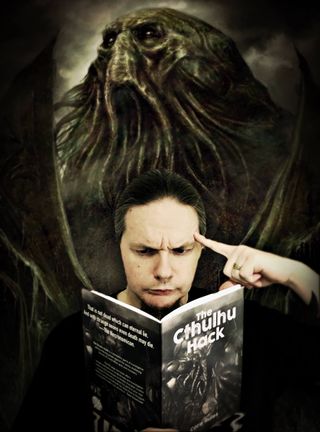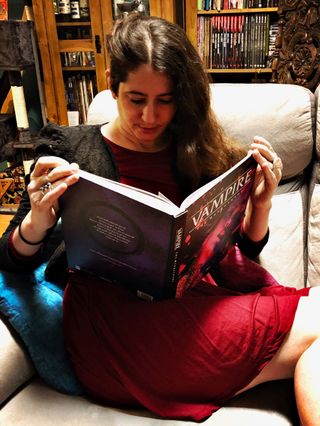As the new year starts trotting along, I thought it would be interesting to have a quick look at the games that are currently on my radar for one reason or another.

Game Day
We had a New Year's Eve gaming party at our house, and managed to cram a little over 20 people into our Berlin flat. With the main table, sofa area, and spare room, we generally had 3 games on the go at once. I played High Society, Campy Creatures, Honey Heist, and ran Hypertellurians (a playtest of an upcoming adventure I'll publish soon), and—finally—Thornwatch.
The latter took a little bit of setup and going through the rules time, as it was everyone's first go at it, mine included. But once we played a handful of rounds, it all clicked into place, and I'm really looking forward to playing it some more; this time dedicating a whole afternoon or evening to it. Mike Krahulik and Jerry Holkins' Eyrewood caught my eye from the first time it made its appearance on Penny Arcade: it's such a flavorful and immersive setting, even before you add the fantastic art.
It was also my first time finally playing the famous Honey Heist. There's just something deeply satisfying about the combination of bearing and heisting. Our characters ultimately had mixed success. Let's see if we can get the gang back together for HoneyCon 2019!
Computerized Enjoyment
On the video game side of things I'm currently immersed in Middle Earth: Shadow of War. Ever since taking the plunge and replacing my sickly old PC a few months ago, I've been trying to push the limits of the new setup with AAA games. I'm happy to report that it hasn't broken a sweat yet, so I'm hopeful I'll get some serious mileage out of the machine. Frankly, I also don't game that much on the PC. But I am enjoying Shadow of War a lot, even if its story rubs a lot of Middle Earth fans up the wrong way. I can totally sympathize with those points, but for my purpose I also happily overlook them and jump around in silly ways and kill orcs.
Most of my video gaming in recent years has been, and continues to be on mobile and tablet. Short bouts and matches that I can start and finish whenever and wherever I have 5–10 minutes to spare. Although I seem to be having a bit of a break from Hearthstone, its app icon remains within reach, just in case. My current go to game is Hero Academy 2, and has been for some months. I'm also toying with Warhammer Champions: Age of Sigmar. For being yet another game in the Collectible Card Game genre, it introduces a whole bunch of new things to the tried and tested formula. Furthermore, it exists as both a physical and digital game, and you can import your physical cards into the mobile version by scanning them. Neat.
Collectible Card Game Quibble
I'd like to take a moment though to quibble about the one stumbling block all CCGs seem to have in common. When you start one, a tutorial with a ready-made deck walks you through the principles of the game. You'll likely unlock a card or two, and the tutorial will instruct you to replace an existing one in your deck because it's better. By the end of the tutorial you've unlocked a whole bunch of new cards, and you're now expected to play against real life opponents.
However, your starting deck is woefully inadequate to compete, and you don't know all the cards or strategies in the game to know enough to build a decent deck given your current collection. The most likely scenario is that you'll lose many times over with your pre-made starting deck until you've either got enough experience to make your own, or unlocked enough cards to build a deck from an online "recipe."
It's that gap between the starting deck and your own, competitive deck that I'd like games to try and bridge. Hearthstone tries, by offering a selection of decks when you create a new one, but you likely don't have all the cards for them. Perhaps that's on purpose, to entice you to spend more money for a chance to unlock the right cards.
Anyway, with the aside finished, let's talk roleplaying games.
Pen and Paper
On Thursdays, I run my ongoing Hypertellurians playtest. We're very much in the final chapter for that. I'll give a bit more of an update on that below. When that game's finished, we'll be returning to D&D 5th edition, for the first time in a while; a friend of mine will be running Waterdeep: Dragon Heist, and I am looking forward to seeing what kind of shenanigans our undoubtedly quirky characters will get up to.
At the same time I am little apprehensive about returning to a system that is quite as structured and rigorous as D&D 5E. Don't get me wrong—when it came out, it was a desperately needed breath of fresh air after the stale 4th edition. While we gave 4E a solid chance, ultimately the insanely long combats, unbearably boring graphic design of all its books, and characters who all played the same give or take a lick of paint, wore us out on it. 5E made D&D exciting again by addressing all those points and more.
However, we have been playing a number of systems recently with far more free form rules or powers or spells, where player creatively added as much, if not more, to the effects than the rules as written. OSR systems like Knave or The Black Hack, story systems like World of Dungeons, and systems inbetween like my own Hypertellurians all forced us to expand on the written word, rather than stringently play within it. It will be interesting to see if and how that experience colors our return to modern D&D. I, for one, hope for wild and wonderful interpretation of classic spells, and approaches to challenges beyond the stats on our characters sheets.
On Mondays we're about to return to Cthulhu, having finished an arc of the classic and famed Enemy Within campaign for Warhammer Fantasy Roleplay. We played using the second edition, and while there's a lot of flavor in that setting, and some nice ideas in the rules (I mean we all love careers in theory), I remain solidly unconvinced by the system. Tiny, largely inconsequential character advances (unless perhaps you were lucky enough to roll a spellcasting starting career), make for very tedious character development. I decided to throw myself into the story of my character instead, and while that's always a nice thing, it would also be nice for the rules to back that up.
I would love to return to that campaign again, but perhaps giving the latest 4th edition of the WFRP rules a try, or maybe even Zweihänder, or heck, go crazy and try it with Shadow of the Demon Lord!

Meanwhile though, it's Cthulhu time. Early last year we also finished Masks of Nyarlathotep (I spelled that right the first time, without looking it up!), using Call of Cthulhu rules. I have the same criticism regarding character advancement here as I did for WFRP 2E. All those tiny percentage increases are tedious and pretty much irrelevant in the face of cosmic horror, so why bother? Indeed, our GM seems to feel similarly about it, so for our upcoming game we're going to give The Cthulhu Hack a go. I'm excited to see how that plays out!
Every other week or so, I play in a Mageblade game. We're exploring Luka Rejec's super cool Ultraviolet Grasslands, using Paolo Greco's rulesystem. What's especially great about the latter is that on top of the magic disciplines from that book, the ones from Wonder & Wickedness, and Marvels & Malisons slot right in. In honor of Luka's love of Blue Öyster Cult, my first character was called Buck Dharma. He died from an incinerating beam of light from a gargantuan guardian statue he turned to flesh. Good times.
On my radar, but with no concrete plans yet are Spire, Shadow of the Demon Lord, and Kult: Divinity Lost. Rowan, Rook and Decard's Spire is a game about revolutionary drow fighting against the cruel and aloof high elves that displaced them from their ancestral home. I've played and run it before, but I'd really like to return to it, now that there are so many great scenarios out to choose from (and some more to land shortly).
Rob Schwalb's Shadow of the Demon Lord didn't grab me during its inaugural Kickstarter, partly because of the generic name, and partly because of the bizarre cover art of the core book. What it should have said on the cover was "You'll really like these rules, Frank!", but I guess that might have been a little too specific. But it's true: the mechanics of SotDL are not just solid, they're inventive (Hypertellurian's initiative system is totally knicked inspired by it), and look great fun. Plus, who doesn't love tons of spell disciplines? So I'm all about the Demon Lord and his titular shadow now.
After hearing a lot of great stuff about it in recent months, not least the interview with Rob Schwalb on the excellent Mud & Blood podcast, and the following review episode, I bought the book, and have been reading it excitedly. I also bought the book for all my players as a Christmas gift, so I think that signals my intentions vis-à-vis demon hierarchies and their sun blocking qualities. Perhaps we'll do a small campaign of that once Dragonheist is finished.
Why the hesitation? Well, because Kult: Divinity Lost. Here's another game that I didn't pay proper attention to when it was first announced. For someone who's played a ton of Vampire: the Masquerade back in the day, it might surprise you to hear that I'm generally not so excited by games set in the modern day.
But after hearing more about Kult (again on the Mud & Blood podcast—see their interview with the creators, and review episodes), the fact that it's published by Modiphius, comes from the seemingly endlessly creative Swedish roleplaying industry, looks absolutely top notch, and deals with gnostic mysticism, I am properly hooked. Mud & Blood describe it as The Matrix meets Constantine, set in the world of Hellraiser.
Yeah, I'd like to play that.
And then on the very other end of the spectrum with have Necrotic Gnome's [B/X Essentials](B/X Essentials) (probably to be renamed in a future release). I've already been massively enjoying the company's Dolmenwood setting, and sprinkled it liberally into my Hypertellurians playtest game, but I've yet to properly return to the original D&D rules it represents. Going back through the gorgeous Black Pudding zines, and their somewhat gonzo but so adorably illustrated additional classes, has got me hooked, and if I'm going to go full old-school, what better way than with the original rules, re-arranged and re-collected for clarity and utility, like B/X Essentials does?
What else has been catching my eye?
Well, I'm always down for some Dungeon Crawl Classics, but here's a system that I thinks works better for a campaign than for one-shots. Its rules require a bit of an investment, but it's one that I believe pays of in the course of the adventures. Besides all the excellent modules, the Purple Planet boxset on my bookshelf keeps grabbing my eye.
I picked up Mutant Year Zero after hearing Matt Kay talk about it, but I've not read it yet. Again, post-apocalyptic settings aren't generally up my alley, but the tone and mechanics of this seem neat, and it doesn't hurt to read it. Also, it's from Sweden's Free League, so it's probably excellent.
Speaking of Free League (now that Järnringen has merged with them), Symbaroum is another game I wouldn't mind returning to. I've got most of the hardcovers—and of course wrote the reference app Symbook for it—though I would probably introduce a few houserules, especially regarding armor and robustness.
The Forbidden Lands boxset caught my eye too of course (our MageBlade GM owns it and it does look shiny and super fun), but I was too late on that bandwagen and currently it's all sold out.

The new 5th edition of Vampire: the Masquerade looks great, and the great Kenneth Hite worked on it, so I expect it packs some serious chops, but I haven't quite finished the book yet. After some controversy, and the renewed dissolution of White Wolf, the game is now in Modiphius's extremely capable hands, so I expect all things Vampire to get right back on track.
And while we're with Modiphius, I should mention that I sprang for the full digital complement of the Conan game they kickstarted a while ago. Those books keep on coming in; I don't even know how they write so many of them! But they look great, the mechanics look interesting, and of course I do love me some pulpy Robert E. Howard action! As of yet though, I haven't managed to find a slot in the agenda for it.
Eyes of the Stone Thief, 13th Age's megadungeon keeps whispering to me to use it in a game.
I have a million Lamentations of the Flame Princess books, but then I already use those in pretty much all of my games to one extent or other. Sometimes directly (I plonked Deathfrost Doom into my heavily modded D&D 5E game a while back), and sometimes I just gut bits and pieces (like all the time for spells and beasts for Hypertellurians).
Hey, what about Pathfinder 2? I don't know, I look at those three pages of character sheet with all the fields crammed in, and my brain just shuts off. We'll see.
In the Works
I'm waiting on the proof for the physical copy of A Bride for Dracula, the first stand-alone book I published under the moniker Mottokrosh Machinations. I have a feeling I mucked something up with the page order, but we'll see. Once that's sorted, and on sale (you can of course pick up the PDF already), my next adventure will go into layout: Brutal Peril in the Bag of Infinite Holding. Like the one before, it's a small adventure suitable for all D&D-like games, old and modern.
As for Hypertellurians, we're fast approaching both the end of the official playtest and version 1 of the rules. I've got one more section to write for players, revisit the GM section, add in sample spells and magic items, and then it's off to the editor. Round about the same time layout will start.
Regarding my existing apps, I've got some urgent changes to do on the Pathfinder Online Character Sheet, as the Google authentication API it's using will be shut down when Google+ shuts down in March. I'd also like to make some minor updates on both Symbook and Spire Companion, but time is oh so limited.
The bigger app still in the works though, is a brand-new online character sheet app, designed not only to eventually replace the existing PF1 one, but to be useable for any number of systems. In fact I'm testing it with a Hypertellurians character sheet at the moment, which has uncovered a couple of critical bugs that need fixing before a possible alpha or beta launch.
So, I think that's about it for me. What games have you got lined up or which games have caught your eye?
